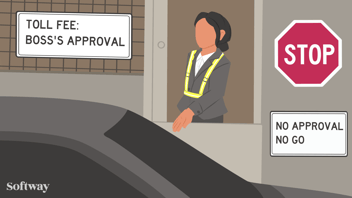
Look, I know there have been layoffs, furloughs, and cutbacks for everyone, but despite this pandemic, I’ve on boarded three new team members to my team in the last month: My 4-year-old son, my 2-year-old daughter, and my wife. Even though none of them work on any of my projects, we all share the same office - and whether I like it or not, we are all now co-workers.
And here’s the most important thing I’ve learned: If we’re going to be co-workers, we might as well be a team.
When I first started on this non-stop work from home adventure, I treated my kids as obstacles. I treated my wife (who is a clinical pharmacist and bounces between the hospital and work-from-home) as an adversary.
“Honey, could you PLEASE keep the kids out of the office?”
“KIDS, please give daddy just 5 more minutes.”
I felt like I was simultaneously dropping the ball at work AND at home.
So one night, after a grueling day of this balancing act, my wife and I decided to sit down and have a heart-to-heart. We started by reminding ourselves of something often said but easily forgotten:
"We are a team."
This is something we always say and believe in, but it’s definitely easier said than done. We wanted to try and practice actual teamwork, and see if we get to a better place.
So, we worked through our schedules - for our work, for the kids’ meals, for activities, etc. We laid out what we struggled with and what we didn’t mind doing. We established ground rules and working agreements. And we talked about our work and what we were trying to get done. All these things we thought we’d figured out as parents already, we had to reassess and actually work through together!
We drew up a plan and got ready to execute it...
So did it work? Yes! But not the way you might think. Anyone with kids knows that half the plans we make go down the drain within the first two hours of the day. (That’s where you stick ‘em in front of a television and just try to survive the rest of the day) But still, things got a lot easier. I realized that it was a change in our mindset that made the difference. I started considering my family as a part of my team, and my team as part of my family. Those things at home that get in the way of work? That’s part of the job. I started by shifting my mindset in this new direction, and I ended up finding some new ways to integrate work and home:
- I introduced my family to everyone on a video call. (They are now officially always invited)
- I shared my wife’s work schedule with the team and explained my thought process behind why some of her time was more important (She’s actually out there saving lives)
- I openly shared my struggles and my mindset. (Being vulnerable with my wife and with my co-workers really made a BIG difference)
- I shared my calendar with everyone. I put both work and home things on it and made it available to co-workers and family. My daughter is still a toddler, but I printed it out and shared it with her too. (She STILL shows up late to every meeting)
I started considering my family as a part of my team, and my team as part of my family.
By including my family obligations in my work decisions—transparently—co-workers responded with flexibility and understanding. By adding my work priorities with my wife seamlessly, she was able to empathize and help me succeed. And of course, I joined her team as well. I learned more about what she was doing at the hospital and at home, and we had deep conversations around her mindset too. Don’t underestimate the power of over-communicating and over connecting during this time.
This is an incredibly challenging time for everyone. Everything is changing, and nothing feels comfortable or routine. Whether we like it or not, our teams now include our families. Are you still trying to separate work and life? Or are you ready to embrace your new team? If you haven’t already, I highly recommend you introduce the “new hires” to the rest of the team and get them on boarded immediately. At the very least, it’s fun to put “potty training time” on your work calendar and see how people react.
Jeff Ma is the Director of Project Management at Softway, and a fierce advocate for bringing humanity to the workplace. He’s also a co-creator and facilitator for the Seneca Series — a radical suite of products designed for sustained culture change.




